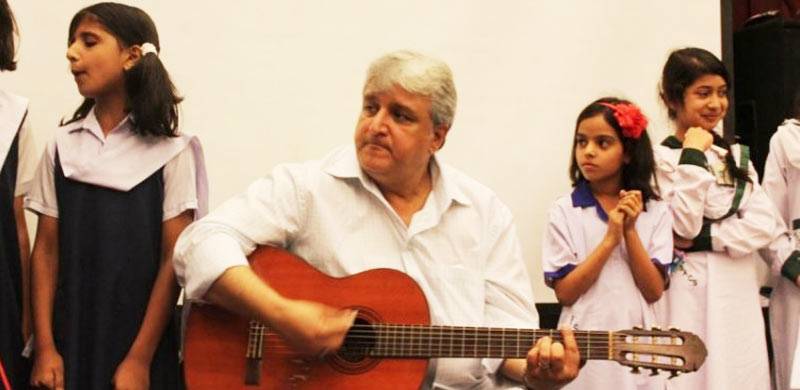
We all know Khaled Anam as a passionate man when it comes to children. Through poems, songs, plays and lectures, the versatile artist has always strived to entertain and educate children. His recent effort, a life-long wish of his, is CEEP (Children’s Education and Entertainment Portal), which serves to teach the children of Pakistan, but in their national as well as their respective regional languages, such as Punjabi, Pashto, Sindhi, Balochi, Brahui, Siraiki and Balti.
Khaled Anam’s concern for children and consequently his research on them has led him to realise that if a child is not well-versed in his or her national or mother language, it becomes extremely difficult for them to understand any other language. This is the main reason why he is bent on creating a better future for the children of Pakistan, in which they may live as confident people who know that they won’t have to rely on other nations’ languages to express themselves. This, according to Khaled Anam, is only possible if a sense of pride and ownership is inculcated among children regarding their own language, which unfortunately is not being done.
He says, “People in Pakistan shy away from speaking Urdu. Parents don’t read Urdu themselves and also communicate with their children in English, a language that isn’t their own. The political leaders speak in English when they go to foreign countries instead of getting a translator to translate Urdu for the foreigners. Children know ABC but they don’t remember Alif Bay Pay, the very basis of their own language. This needs to stop.”
However, the importance of language, as told by the artist, is not limited to the children alone.
“Lately, I have been observing how societies, people and houses are divided on the basis of language, for people become judgmental when it comes to language. They measure the caliber of each other’s social and educational background through it, a simple case being Pakistan’s obsession with English and their belief that it is the language of the superior. This is so disheartening, especially when such jokes develop into serious issues and result in class differences. Even after seventy years of Pakistan’s inception, we are fighting over which language to adopt,” says the actor, singer and lecturer, who also believes that schools should introduce games in which students are asked to read out in every regional language so that all languages of Pakistan gain an equal status.
“Nations are always built upon languages,” he says. “People around the world speak their own language and wear their own clothes because they don’t suffer from any kind of complex. I wonder why we are living as a confused nation. This can come to an end only if the younger generation is trained in a manner that is different from the currently running patterns of instruction and education. Therefore, I believe that it is the children who can make a difference. It is in their learning years that they can be easily taught to love and respect their language, so that they grow up to become clear-minded and confident people.”
Khaled Anam’s channel can be accessed on YouTube, while it has its Facebook and Instagram pages as well.
Khaled Anam’s concern for children and consequently his research on them has led him to realise that if a child is not well-versed in his or her national or mother language, it becomes extremely difficult for them to understand any other language. This is the main reason why he is bent on creating a better future for the children of Pakistan, in which they may live as confident people who know that they won’t have to rely on other nations’ languages to express themselves. This, according to Khaled Anam, is only possible if a sense of pride and ownership is inculcated among children regarding their own language, which unfortunately is not being done.
He says, “People in Pakistan shy away from speaking Urdu. Parents don’t read Urdu themselves and also communicate with their children in English, a language that isn’t their own. The political leaders speak in English when they go to foreign countries instead of getting a translator to translate Urdu for the foreigners. Children know ABC but they don’t remember Alif Bay Pay, the very basis of their own language. This needs to stop.”
However, the importance of language, as told by the artist, is not limited to the children alone.
“Lately, I have been observing how societies, people and houses are divided on the basis of language, for people become judgmental when it comes to language. They measure the caliber of each other’s social and educational background through it, a simple case being Pakistan’s obsession with English and their belief that it is the language of the superior. This is so disheartening, especially when such jokes develop into serious issues and result in class differences. Even after seventy years of Pakistan’s inception, we are fighting over which language to adopt,” says the actor, singer and lecturer, who also believes that schools should introduce games in which students are asked to read out in every regional language so that all languages of Pakistan gain an equal status.
“Nations are always built upon languages,” he says. “People around the world speak their own language and wear their own clothes because they don’t suffer from any kind of complex. I wonder why we are living as a confused nation. This can come to an end only if the younger generation is trained in a manner that is different from the currently running patterns of instruction and education. Therefore, I believe that it is the children who can make a difference. It is in their learning years that they can be easily taught to love and respect their language, so that they grow up to become clear-minded and confident people.”
Khaled Anam’s channel can be accessed on YouTube, while it has its Facebook and Instagram pages as well.
